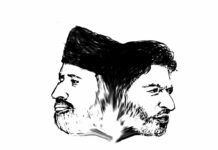Muhammad Tahir
Usually, I do not make regular entries into my personal dairy; writing about mundane and trivial things everyday does not make sense to me. But then September 2014 was no ordinary month. To paraphrase Eliot, it was the cruelest month.
As soon as I was able to climb a wooden portable stair through our neighbour’s and enter my room on the second floor of our house, I grabbed a fresh unused notebook and started registering my thoughts and experiences for the next two weeks.
Today when I leaf through the pages of my dairy, I can see traces of anxiety and hurriedness in my badly executed free style handwriting; the incoherence of my sentences perhaps reflect the tremendous burden one felt, during those trying moments, to survive through the calamity, and hold each other’s hands so that one didn’t succumb to the pressure but stand it doggedly.
What I infer from the words and ideas I was able to capture in my dairy is that the flood of September 2014 – while rendering the life awry and making the infrastructure collapse – had a particular bearing on the public discourse. For example, in my dairy entry dated 14 September, 2014 I write: “The one particular proverb that I hear from almost every elderly person now-a-days is like this: ‘Raatuk shah, aziuk gadah’ (Yesterday’s rich man is miserable one today)”. In the context of Pampore, where I live and where I heard this, people were making such remarks especially on those upper middle class families who were seen carrying disheveled selves, running from one place to another in distressed panic because their palatial house had been submerged in the murky waters up to two-storeys. Although said in the general atmosphere of humility momentarily brought on the people by the nature’s furious hand, there was a peculiar tinge of schadenfreude in such remarks though, because the nozzle of the smirking gun was trained at a particular class, who lived in prosperous ghetto-like clusters around Pampore. If ‘Raatuk shah, aziuk gadah’ was a veiled quip, it was patently obvious in the remark ‘Yiman gov asal’ (They deserved it) that who the target was.
On the same page I further write: “Another remark on people’s tongue is: ‘Ye ous na salaab, ye ous khuda sundh kahar’ (This was not flood, it was a divinely wrath)”. What this remark suggests is that people perceived the flood as a divine punishment. Such framing of a natural calamity can be said to be influenced by orthodox understating (reinforced even by Biblical or Koranic stories) of the workings of the nature; anthropologically speaking, this understanding or belief ascribes anthropomorphic features on an un-animated entity like nature. For the most people (especially Muslims) of Kashmir, there was clearly God’s hand in the massive devastation. Therefore, as a consequence of such perception people were inclined to say, and I registered in my dairy: “Yuuta kehn gov, magar wuni chi na aed lukh futan” (All this catastrophe has not made some people humble enough yet).















